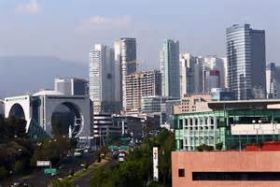What is the business culture in Mexico?
John Venator - Casa de los Venados
.jpg) Generally, when you come here to Mexico as an expat, you get different kinds of immigration visas. We happen to have one that is good for 5 years that is called Residente Permanente. At the end of the 5 years, we can apply for Mexican citizenship and be dual citizens, which right now no one has convinced me that there is an economic advantage to do.
Generally, when you come here to Mexico as an expat, you get different kinds of immigration visas. We happen to have one that is good for 5 years that is called Residente Permanente. At the end of the 5 years, we can apply for Mexican citizenship and be dual citizens, which right now no one has convinced me that there is an economic advantage to do.However, our particular Residente Permanente visas exclude us from being engaged in business. We know an acquaintance who is...
.jpg) Generally, when you come here to Mexico as an expat, you get different kinds of immigration visas. We happen to have one that is good for 5 years that is called Residente Permanente. At the end of the 5 years, we can apply for Mexican citizenship and be dual citizens, which right now no one has convinced me that there is an economic advantage to do.
Generally, when you come here to Mexico as an expat, you get different kinds of immigration visas. We happen to have one that is good for 5 years that is called Residente Permanente. At the end of the 5 years, we can apply for Mexican citizenship and be dual citizens, which right now no one has convinced me that there is an economic advantage to do.However, our particular Residente Permanente visas exclude us from being engaged in business. We know an acquaintance who is running a business here and did not have a visa that allows him to do commercial activities and somebody tipped off the immigration people. He was detained for about 3 weeks in an immigration facility and was scheduled to be deported. The good news was, he hired a good lawyer and instead of being deported and not able to come back for 5 years, Mexico has installed a new program that has a forgiveness clause that says, basically, “Shame on you, but since you created a business and you are probably creating economic development here, and you might even have a couple of employees, we will waive the law.” There is a forgiveness period so they allowed him to apply for the new Residente Permanente visa with the privilege of doing commercial activities and he had to pay a fine of 50,000 pesos, or US $3,200. He had to stay out of the country for over a month before he came back to apply for that new Residente Permanente Visa with commercial privilege activities.
A number of expats have the idea that they are going to come down and maybe become a tour guide or own a restaurant or do some other kind of things. You need to be respectful and knowledgeable about what the country's laws are. If you do not have the right visa and you are prohibited by the visa you have for non-commercial activities, do not do it, because, generally, if you are deported you cannot come back to Mexico for a minimum of 5 years. If you are fully retired, your sources of income or any commercial activities you are doing are okay back in the US. Do not engage in commercial activities here unless you have the right visa.
(Luncheon at the home of John and Dorianne Venator (center) with Yucatan State Governor Ivonne Ortega (right) and Gloria Guevara (far left), Sra. Guevara, Mexico's National Secy. of Tourism, Valladolid, Mexico pictured.)
Posted October 5, 2015
Jesus Celis - RH Fiscalis
 There are several ways in which the business culture in Mexico is different from the US. For example, the minimum salary in Mexico is 73 pesos (about US $4) per day, while in the US, it averages about $8 per hour, so an average American worker making minimum wage earns twice as much in one hour than a Mexican worker making minimum wage earns in a whole day.
There are several ways in which the business culture in Mexico is different from the US. For example, the minimum salary in Mexico is 73 pesos (about US $4) per day, while in the US, it averages about $8 per hour, so an average American worker making minimum wage earns twice as much in one hour than a Mexican worker making minimum wage earns in a whole day. In specific cases, the business culture in Mexico depends on the company and it...
 There are several ways in which the business culture in Mexico is different from the US. For example, the minimum salary in Mexico is 73 pesos (about US $4) per day, while in the US, it averages about $8 per hour, so an average American worker making minimum wage earns twice as much in one hour than a Mexican worker making minimum wage earns in a whole day.
There are several ways in which the business culture in Mexico is different from the US. For example, the minimum salary in Mexico is 73 pesos (about US $4) per day, while in the US, it averages about $8 per hour, so an average American worker making minimum wage earns twice as much in one hour than a Mexican worker making minimum wage earns in a whole day. In specific cases, the business culture in Mexico depends on the company and it depends on the area. For example, it’s not the same business culture in Cancun compared to Merida or Campeche because they are different cities, even though each one is the capital of their state in the Yucatan Peninsula. For example, both Merida and Cancun are cosmopolitan, friendly, and have open arms to receive investors. But the difference between Cancun and us in Merida is that Cancun is exclusively for tourists, while the business in Merida is based on commerce and services. This makes Merida similar to Campeche in this regard, but Campeche has less than half the population of Merida, so Merida has a different culture.
In Mexico City, there are many factories and industries so it’s got a different culture. The business culture also depends on the extent to which the drug dealers and other people scare the good people in other states. When this happens, the state of Yucatan receives a lot of people who they are running away from in their own state, from areas such as Guadalajara, Mexico City, Sinaloa, and Tamaulipas. So a lot of people come Merida every day because they are running from their state and they want to restart their lives in a new state with peace, in a quiet state. Merida is considered one of the quietest cities in the whole country, which is good news for us because, as a result, a lot of people come to invest to Merida in businesses and other things, including real estate because they have to buy a house for their families. Consequently, Merida has a different culture because so many people come here from the other states.
My advice to clients from the US is to be aware of the tax system and the rules, which can be different for foreign people from US. Two weeks ago I was explaining to a couple that came to my office who were trying to form a corporation, so I explained the process. The wife was annoyed because they had been working here without papers for 3 or 4 months doing construction and repairing houses but everything was in cash, which made it difficult for them to comply with the tax authorities. When I explained that she had to have receipts, she said, “Well, that’s complicated because I was never told that you have to follow these rules.” That’s where we start to tell newcomers that in Mexico there’s a different culture, and you have to follow rules compared with the rules you usually use in your own country.
(Pictured: Mexico City Santa Fe Distrrict.)
Posted April 2, 2016
Alberto Alvelais - Alvelais & Asociados
 The law in Mexico is different than the law in the US, which is based on Common Law. Here in Mexico, the banking system, the financial system, the currency system, the language, the culture; everything is different, so you cannot compare the two, except that it works.
The law in Mexico is different than the law in the US, which is based on Common Law. Here in Mexico, the banking system, the financial system, the currency system, the language, the culture; everything is different, so you cannot compare the two, except that it works. When people try to enter Mexico to invest, they think that the system of law will be alike, which can create many bad surprises, especially when they’re beginning to do business and they...
 The law in Mexico is different than the law in the US, which is based on Common Law. Here in Mexico, the banking system, the financial system, the currency system, the language, the culture; everything is different, so you cannot compare the two, except that it works.
The law in Mexico is different than the law in the US, which is based on Common Law. Here in Mexico, the banking system, the financial system, the currency system, the language, the culture; everything is different, so you cannot compare the two, except that it works. When people try to enter Mexico to invest, they think that the system of law will be alike, which can create many bad surprises, especially when they’re beginning to do business and they try to do things the way that they did in their countries and they notice that it’s completely different. New investors can make a lot of mistakes, operationally, and very importantly, with regard to labor laws. Labor law in Mexico is completely different from other countries and you need to be very aware of that when employing people because it’s very easy to be subject to labor lawsuits if you don’t know perfectly the Mexican law. That’s why my advice is to hire a corporate attorney that will bring you hand in hand during this learning process. After the beginning, there will be more clarity, but at the beginning, you need a coach, who is the lawyer, and you need a Mexican accountant.
Regarding other cultural issues, Mexicans are not consistently on time. At the beginning, foreigners may be frustrated at this but at the end they are OK with it. Even though it’s different, it works. Sometimes it can be frustrating even for Mexicans who arrive on time. The cultural norm of not being on time, however, is changing. As an example, in Yucatan, people may show up late, but in Mexico City and in other big cities, they are always on time.
(Mexico City, the capital of Mexico, pictured.)
Posted May 11, 2016
David Schwendeman - Mexlend
 The short answer is that in the US and Canada, people tend to “live to work.” The business culture is very career-minded, with an attitude of having to do the time and to put in as many hours as you can to impress the boss. In Mexico, the business culture is different. It’s more of a “work to live” environment where family takes precedent over an extensive workweek of many hours.
The short answer is that in the US and Canada, people tend to “live to work.” The business culture is very career-minded, with an attitude of having to do the time and to put in as many hours as you can to impress the boss. In Mexico, the business culture is different. It’s more of a “work to live” environment where family takes precedent over an extensive workweek of many hours. This can seem a little bit unusual for...
 The short answer is that in the US and Canada, people tend to “live to work.” The business culture is very career-minded, with an attitude of having to do the time and to put in as many hours as you can to impress the boss. In Mexico, the business culture is different. It’s more of a “work to live” environment where family takes precedent over an extensive workweek of many hours.
The short answer is that in the US and Canada, people tend to “live to work.” The business culture is very career-minded, with an attitude of having to do the time and to put in as many hours as you can to impress the boss. In Mexico, the business culture is different. It’s more of a “work to live” environment where family takes precedent over an extensive workweek of many hours. This can seem a little bit unusual for somebody moving down here but it’s actually really wonderful once you’re immersed because, of course, family and quality of life, as we know, is more important. The Mexican business culture contributes to a healthier lifestyle, as opposed to the US and Canada, where you tend to get caught up in the grind.
You still have to work hard if you’re going to have a successful business in Mexico. There are just elements in the culture that reinforce a better standard of living with the emphasis on family, friends and taking some time to enjoy a two hour lunch, a real vacation and stopping to “smell the roses.”
Relationships are very important in Mexico. For example, we moved to Puerto Vallarta from New York City and I’m not going to say it’s easy to forge relationships in New York City, but typically if you have a product to offer and you’re offering it a fair price and you bang on a lot of doors, you’re going to meet the right people and once you meet them and get that agreement going, you’re done. You don’t necessarily spend a lot of time socializing with all of your providers or the people you provide services to or who provide services to you. In Mexico, it’s very much more about forging and nurturing those relationships. The people you court in business really want to get to know you before committing to do business with you. This realization was kind of a wake-up call moving to Mexico because we had plans to be “rocking’ and rolling’” in about 6 months. Well, it took more like 2 years before we earned the trust and respect of those we needed behind us. Anyone launching a business needs to be aware of this.
(Women working on a business negotiation in a Mexican restaurant, Mexico, pictured.)
Posted May 30, 2016
Tom Leonard - Hotel Perico
 Somebody once told me, "In the States, business is business." It means that even if you don't like the person you're conducting business with, but he gives you a good deal and provides good service, then you're going to keep working with him. In Mexico, this is not the case.
Somebody once told me, "In the States, business is business." It means that even if you don't like the person you're conducting business with, but he gives you a good deal and provides good service, then you're going to keep working with him. In Mexico, this is not the case. In Mexico, if you don't have a good, respectful, and trusting business relationship with someone, it's not going to work out. The business will fall apart....
 Somebody once told me, "In the States, business is business." It means that even if you don't like the person you're conducting business with, but he gives you a good deal and provides good service, then you're going to keep working with him. In Mexico, this is not the case.
Somebody once told me, "In the States, business is business." It means that even if you don't like the person you're conducting business with, but he gives you a good deal and provides good service, then you're going to keep working with him. In Mexico, this is not the case. In Mexico, if you don't have a good, respectful, and trusting business relationship with someone, it's not going to work out. The business will fall apart. There should be some type of connection. If it's just purely business and you don't like the person or they don't like you, the business will not work out.
Conducting business in Mexico is different than in the States because you need to build friendships, which is the biggest difference. The people you do business with eventually become your friends, considering all the different levels of friendships. In the States or other places, you can do business with somebody even though they are not your friends.
The other thing is that almost anything will take longer in Mexico, like banking or other business transactions.
For example, we have a hotel business where we must have a contract with a "sindicato" (labor union) because they protect the workers. The sindicato receives payment for certain things paid in Mexico, especially if you have employees. This is on the level, but this payment is useless. I paid and gave them the information in January. Right now, in the middle of May, is when they brought the paperwork for 2017. It took them five months to bring the receipt.
Business is a little difficult because there's a lot of red tape and hoops to jump through. I must have an accountant to help me here in Mexico. It's a little tricky to do business in Mexico because there are a lot of things you must do or are not supposed to do.
In Mexico, they always want a lot of paperwork. For example, applying for a business license, you need to submit a lot of paperwork that's sometimes unnecessary. It can be a little frustrating and slow.
One thing that's better in Mexico is that there is more flexibility to conduct business here. In the States, everything is "black and white". There's a rule about everything. Here in Mexico, they're a little bit more flexible with the rules. For example, I have to pay for business permits, but I get several months to pay for it fully. I get discounts if I pay within the first two months of the year. In the States, they don't give that flexibility and things must be paid on time. If you're late, you get a fine.
There have been times in Mexico that I was late on something and have had officials come up to me. Like one time, I forgot to pay some tax, which wasn't a big deal. The official just said to me, "Okay, just go down to the office and pay for it." He went to me to remind me, but I didn't receive any fines. I went to their office the next day, paid, and everything was fine. If that happened in the States, I would need to pay for a fine as well.
Somebody once said, "If you live in Mexico, you need to be flexible."
(Friends helping Hotel Perico get their balloon up, Ajijic, Mexico, pictured.)
Posted July 20, 2017



.png)